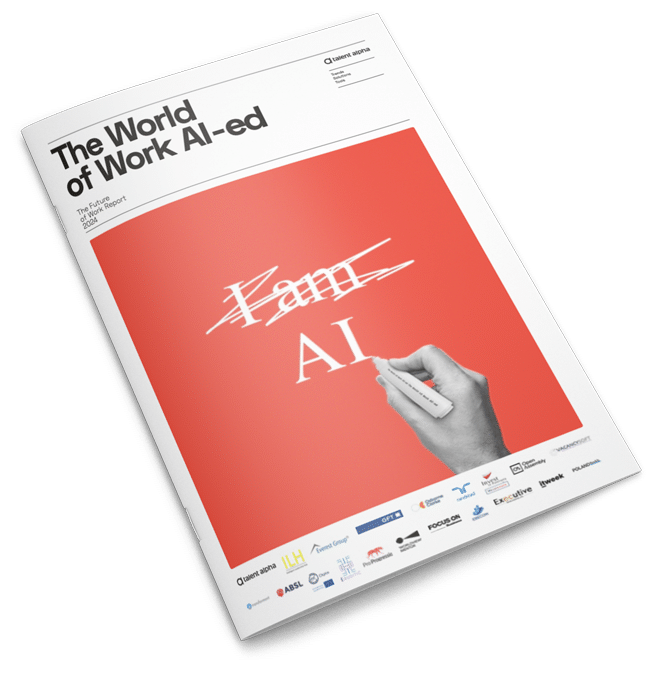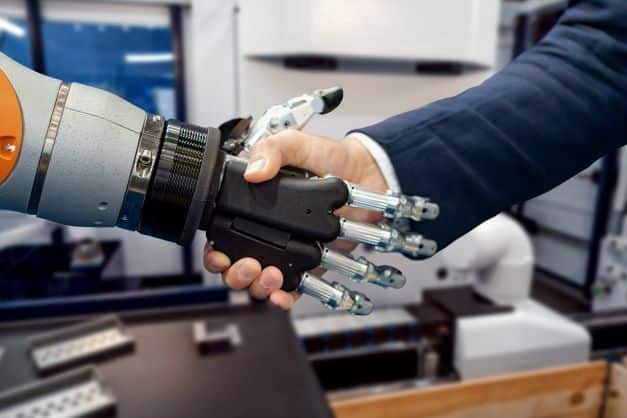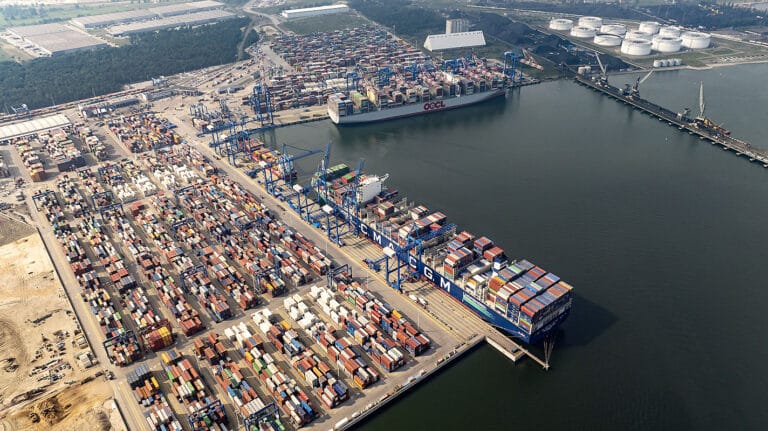AI increases employee productivity by 30%
According to data in the latest Talent Alpha report, The World of Work AI-ed, over 90% of leading service providers, as well as one-third of all workers, are already using AI solutions. As a result, some companies have experienced significant productivity growth. However, AI poses enormous challenges that could lead to the darkest scenarios. The leaders of these changes, who are responsible for the future of the job market, are managers in companies implementing AI. The report provides them with knowledge, highlights good solutions and tools, and describes the challenges facing the sector. It also offers specific guidance for leaders on the steps needed to prepare themselves and their employees for the new reality.
According to research from Everest Group, over 95% of global business services leaders believe that generative AI will significantly impact how their companies approach service delivery. The business sector and companies all over the world are leading this AI revolution. However, many managers are not ready for the new reality.
“The Future of Work Report ‘The World of Work AI-ed’ was created with managers in mind. Collaborating with experts working in international companies, implementing advanced AI projects, and advising global leaders, we explain phenomena related to AI in an accessible way. We highlight key considerations and provide practical guidance,” – comments Agnieszka Porębska, CEO of Talent Alpha, the host of the report, and a platform which provides IT specialists and manages them in 52 countries.
Strategic partners of the publication include Everest Group, Osborne Clarke, Randstad, GFT, ABSL, Pro Progressio, EIT, Eruditic, Open Assembly, Transformant, Vacancysoft, and World View Mentor. The report’s gold patron is Invest in Pomerania. The report’s media partner is Poland Weekly.
AI – the future depends on us/ AI – the future is in our hands
AI has the potential to bring about tremendous positive changes in the world. However, its uncontrolled adoption can also lead to catastrophe. Talent Alpha and experts from the Intelligent Leadership Hub (ILH), a global organization of leaders and advisors, have prepared two scenarios for the development of AI: positive and negative. ILH specialists emphasize that while the scenarios may be shocking, both are realistic, and the future is still solely dependent on humans and their decisions.
The founder of The Intelligent Leadership Hub, Ade McCormack, emphasizes that we should prepare for the possibility that in the face of an AI revolution, the majority of organizations may be brought to the brink of collapse, and in the next few years, we will probably witness mass unemployment, triggering social unrest. However, organizations should not try to change existing business models but rather build parallel ones. Intelligent management is one in which there is permission to experiment and make mistakes, and decision-making is decentralized.
“We are at an unstable moment in our existence with emerging technology that has the potential to dominate us. In the report, we describe the associated threats, emphasizing that we are at a pivotal moment for humanity. This is an opportunity to reawaken our natural cognition. AI combined with natural intelligence turns workers into mental athletes. Humanity is given a second chance. The report explores both the general aspects of AI development and addresses the practical aspects of how we can move forward. The stakes are high, but so is the potential reward,” – highlights Ade McCormack.
Will AI exceed human creativity?
According to the most recent data, AI already has the capacity to outpace the human brain in many aspects of creativity. Erik Guzik, an assistant clinical professor at the University of Montana’s College of Business describes in the report results from his research which suggests that AI can match the top one percent of human thinkers on a Torrence’s test of creativity. AI provides not only a lot of new ideas but also very original ones.
“AI’s potential is endless, surpassing our individual capabilities because of its superior access to knowledge. However, I believe that for now, AI cannot replace us as creators. It is a tool that we can leverage in businesses to solve problems. That being said, I don’t believe AI is able to identify areas of its own inner curiosity and interest which I believe is a core element of creativity in general,” – comments Erik Guzik.
Key competencies
Progress in the field of AI brings about many changes in the realm of sought-after employee competencies. Everest Group indicates that some roles in companies will disappear, and new needs will arise, especially in the area of skills related to the development of AI tools. Companies will need to actively engage in the process of reskilling and upskilling and implement change management processes. According to OECD data, in the majority of European regions, every second employee is at risk of being replaced by automation and AI. This is confirmed by Randstad’s research, which shows that 50% of respondents feel uncertain or even fear difficulties in maintaining or finding employment in the face of the development of these technologies.
Changes are already visible in the IT industry. According to Vacancysoft, the annual total vacancies for IT in 2023 is on track to see the lowest number of development vacancies in the last five years. Quantitative tightening and the impact on IT have had an impact for sure, but the structural change caused by generative AI is also real and happening.
“Generative AI will require greater involvement in several aspects. Firstly, developers who specialize in AI. Although they currently represent a niche sector, these numbers are expected to grow. Secondly, data specialists – people skilled in this area will become increasingly in demand with businesses looking to improve legacy data capture processes as there would be real value in doing this. And cyber security specialists, because AI combined with the escalating geo-political situation will lead to ever-increasing threats to business,” – highlights James Chaplin, CEO at Vacancysoft.
Will AI boost growth in IT services?
AI does not yet significantly impact the revenues of IT service companies. According to a Talent Alpha study conducted with approximately 100 IT service industry managers in 41 countries, AI in IT is currently mainly used for content generation (68%) and supporting sales and marketing (54%). Just 37% of respondents indicated using AI for code generation, and only a few percent claimed that their company is working on utilizing AI to build or enhance their products. Half of the respondents believed that AI would accelerate the growth of the IT services sector in the coming years while the other half were not yet convinced. This is influenced by a significant barrier to entry into profitable full-scale AI projects and the prospect of potential layoffs in the industry due to automation. However, it’s worth noting that a substantial 83% of respondents expect AI to contribute to the development of their organizations.
“AI has enormous potential for IT, but so far, it has not had a significant impact on the IT services businesses. In the future, its influence will depend on the strategies adopted by companies. Organizations that implement AI solutions and strengthen their offerings for clients will gain an advantage. Companies that remain in the realm of basic services and primarily provide manpower rather than technological solutions will start falling behind,” – comments Agnieszka Porębska, CEO of Talent Alpha.
Significant change await HR
According to GFT, the introduction of AI into HR processes is a milestone in improving work efficiency. Through data analysis, companies can optimize the acquisition of specialists, streamline implementation processes, and enhance outcomes.
A recent interaction between Everest Group and certain industry leaders found that candidates were utilizing generative AI to craft remarkably precise resumes with over 90% aligning closely with job descriptions. This situation poses challenges for recruiters in talent acquisition, making it necessary for humans to validate the information presented on resumes. For that reason, shifting to skill-based hiring will prove beneficial, as employers prioritize this approach over credential-based decisions, as highlighted by experts from Everest.
Meanwhile, many questions regarding AI and HR activities revolve around legal aspects, as one of the crucial challenges connected with using AI in HR processes is ensuring compliance with non-discrimination regulations in employment.
“The non-discrimination prohibition extends to tools that employers use, for example, in the recruitment process. Despite apparent neutrality and objectivity, AI can replicate human biases or introduce new forms of bias, depending on how such tools are created and trained. Improper use of AI can lead to violations of employees’ rights,” – says Anna Golenia-Wójcik, Senior Associate, Osborne Clarke.
The report describes key regulations and legislative developments in the field of AI of which leaders in companies should have, at the minimum, general knowledge.
Download “The Future of Work Report: The World of Work AI-ed”
***
Talent Alpha (TA) is one of the world’s largest networks of IT services companies, connecting nearly 900 organizations from 52 countries. Its innovative platform provides fast access to IT specialists from a pool of over 50,000 professionals and trusted IT service providers worldwide. The Talent Alpha platform is also used by organizations to manage their suppliers and candidates. It assists smaller service providers in collaborating with major players in the IT market, securing attractive projects, and successfully operating in local communities.
The Future of Work Report is a regular publication by Talent Alpha and its partners addressing challenges in the job market and current trends. So far, the series has included: “7 Drivers Shaping the Future of Work,” “From Headcount to Skill Count,” and “A3 Revolution: Anytime, Anyplace, Anywhere.”







